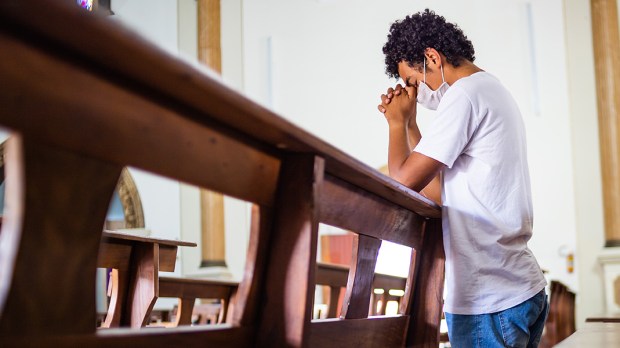In the past months, the pandemic has led to the revival of the practice of spiritual communion — the act of asking and desiring Jesus to enter our soul as if we were receiving Him sacramentally at Mass. St. Thomas Aquinas taught that we can “spiritually eat” with our desire for the Eucharist and receive its graces when we are unable to receive physically.
When I was offering “Zoom Masses,” I would hold the chalice and Host to the camera after the “Lamb of God” and pause for the virtual congregation, wherever they might be, to make an act of spiritual communion:
My Jesus, I believe you are really present in the Blessed Sacrament. I love you more than anything in the world, and I hunger to receive you. But since I cannot receive Communion at this moment, feed my soul at least spiritually. I unite myself to you now as I do when I actually receive you. Never let me drift away from you. Amen. (St. Alphonsus Liguori)

Read more:
5 Spiritual communion prayers for when you can’t attend Mass
Before the pandemic, many Catholics probably had not heard of this centuries-old practice, but they’ve now found they grew to love the Eucharist more because of it. As public Masses are gradually being offered again, it’s tempting to pack away this devotion until the next crisis.
Instead, Catholics attending Mass virtually or in person would do well to continue making daily spiritual communions, in good times and in bad, in sickness and in health.
Having experienced the powerful effects of this practice, St. Teresa Avila advised:
When you do not receive communion and you do not attend Mass, you can make a spiritual communion, which is a most beneficial practice; by it the love of God will be greatly impressed on you.
But spiritual communion can also be made on days when one physically attends Mass and receives communion. Rather than a mere substitute for receiving the Eucharist, spiritual communion intensifies our hunger for the sacrament and renders its actual reception more fruitful. When friends who are apart communicate regularly with one another, how sweet and familiar is the encounter–the communion–when they meet again in person!

Read more:
Reflect on this powerful quote about spiritual communion
St. Alphonsus Ligouri recommended making a spiritual communion three times — beginning, middle, and end — during a visit to the Blessed Sacrament or at Mass. In fact, there is no limit to how many spiritual communions one can make in one day. St. Alphonsus wrote:
Blessed Agatha of the Cross made 200 spiritual communions in the day; and Peter Faber, the first companion of St. Ignatius, used to say that spiritual communions are a most powerful help to receive the holy Eucharist with the proper dispositions.
While spiritual communion is often prescribed to the laity, especially those who are homebound or hospitalized, priests would also benefit from it. After passively listening to people devoutly pray the spiritual communion prayer (above) for several Sundays, I felt moved to pray it outside of Mass as well.
This act of spiritual communion repeated throughout the day became a re-living of a mini Good Friday and Holy Saturday, longing for Easter Sunday. Though I am nowhere close to making 200 daily spiritual communions, the practice of repeating them throughout the day has nevertheless renewed my love and reverence for the great mystery that I celebrate with the Church each day.
Spiritual communion is not just for times of pandemic or other extraordinary circumstances. Spiritual communion is for all times.

Read more:
Bishop Barron: What is happening at Mass?

